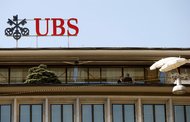 Arnd Wiegmann/ReutersUBS reported first-quarter earnings on Tuesday that were much stronger than predicted.
Arnd Wiegmann/ReutersUBS reported first-quarter earnings on Tuesday that were much stronger than predicted.
11:33 a.m. | Updated
Despite persistent unemployment, malaise and continuing debt problems, one sector in Europe seems to be benefiting: European banks.
After years of painful job cuts and moves to make portfolios less risky, several large European institutions reported strong first-quarter results in recent days, helped by cost-cutting and better performance of major units.
On Tuesday, the Swiss bank UBS and the Lloyds Banking Group of Britain surprised investors by reporting better than expected earnings for the first quarter, sending their shares up.
European lenders certainly continue to confront broad economic challenges like the burden of euro zone debt and pressure from regulators to strengthen their capital reserves. But there have been signs that some of the bigger banks are returning to health.
UBS reported a first-quarter profit of 988 million Swiss francs ($1 billion). Those results were down slightly from 1 billion francs in the period a year earlier, but far exceeded the 412 million francs predicted by analysts surveyed by Bloomberg News.
Sergio P. Ermotti, the chief executive, said in a statement that he was very pleased with the performance. He cautioned that it was “too early to declare victory,” but said the earnings showed the company’s “business model works in practice.”
The British banks Royal Bank of Scotland and HSBC, along with the French bank BNP Paribas, are among those still scheduled to report first-quarter figures in the coming days. But so far, the first-quarter results paint a somewhat encouraging picture of banks that have managed to limit losses from bad loans linked to the credit crisis, while reducing costs and returning to their core banking operations: credit and mortgages for some and wealth management for others.
Some investors caution that the continuing difficulties in the euro zone and weak demand for loans mean that many European banks remain in trouble despite relatively good earnings in the first quarter.
“They are doing their utmost to have a decent banking model and the numbers across the board were very good, but going forward we now have the issue of where the growth is going to come from,” said Florian Esterer, a fund manager at the MainFirst Group in Zurich.
Still, European banks are moving actively to address their problems, including by sharply cutting costs in the face of changing regulations and a sluggish European economy. Deutsche Bank, which reported earnings on Monday, said first-quarter profit rose as cost-cutting offset a decline in revenue from investment banking. Deutsche Bank’s stock also rose rose 4.7 percent in Frankfurt on Tuesday afternoon on the news that it would issue new shares to bolster its capital reserves.
UBS, meanwhile, has been eliminating 10,000 jobs, reducing bonus payments, scaling back its investment banking trading business and focusing more on its successful wealth management operation. Those steps helped the bank’s first-quarter results.
Net new money at its global wealth management business was 23.6 billion francs in the first quarter, compared with 10.9 billion francs in the period a year earlier. Pretax profit at wealth management outside the Americas fell 28 percent, to 664 million francs, while earnings at wealth management in the Americas rose 19 percent, to 251 million francs.
UBS also joined other banks, including its Swiss rival Credit Suisse and Barclays of Britain, in benefiting from higher revenue at its investment banking operation. At Credit Suisse, pretax profit in its investment banking division rose 43 percent, the bank said last week. Barclays, which also reported earnings last Wednesday, said pretax profit for its investment bank rose 11 percent in the quarter.
Analysts say European banks are starting to recover from the fallout from numerous financial scandals that have hurt their reputations.
UBS, for example, has sought to rebuild trust among clients after it uncovered a $2.3 billion trading loss in 2011 connected with the activities of a former trader, Kweku M. Adoboli, who has since been sentenced to seven years in jail. In December, UBS said it would pay $1.5 billion in fines to settle a case related to the manipulation of the London interbank offered rate, or Libor.
Many of the other large European banks have also been ensnared in the rate-rigging scandal. Deutsche Bank has set aside 2.4 billion euros ($3.2 billion) to cover the potential cost of proceedings that include a tax evasion inquiry in Germany and an international investigation into accusations that its employees and those at other investment banks colluded to fix benchmark interest rates.
While financial institutions will continue to address such issues, there is a cautious optimism now about bank performance.
“There are still some headwinds, but banks are pretty much there when it comes to reaching the right level of capital and that is helpful,” said Cormac Leech, an analyst at Liberum Capital. “There is a new appetite for banks among investors. There’s a confidence that wasn’t there two years ago.”
Jack Ewing contributed reporting.
Article source: http://dealbook.nytimes.com/2013/04/30/during-earnings-season-european-banks-show-signs-of-health/?partner=rss&emc=rss

